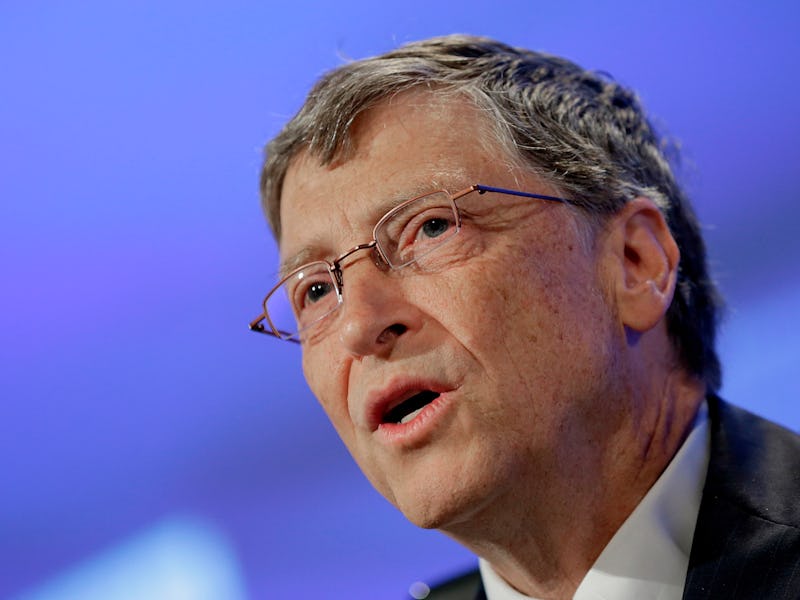Bill Gates Argues Apple Should Unlock iPhone in San Bernardino Case
The Microsoft co-founder believes the government: this would be a one-time hack.

Another voice joins the cacophonous Apple vs. United States government opinion rabble: John McAfee Bill Gates. Tuesday morning, in an interview with Financial Times, the Microsoft co-founder and now-“technology advisor” decided to play the contrarian. Apple CEO Tim Cook, Gates suggests, is misleading the public: this case would not set such a daunting, strong precedent, and Cook is wrong to say that a government victory “would be the equivalent of a master key, capable of opening hundreds of millions of locks.”
“This is a specific case where the government’s asking for access to information. They’re not asking for some general thing; they’re asking for a particular case,” Gates told FT. “Apple has access to the information. They’re just refusing to provide the access, and the courts will tell them whether to provide the access or not.”
District court cases in the United States do not set precedents in stone, though many within the judicial system would prefer that to be the case. Within a specific jurisdiction the precedent is stronger, but when lawyers attempt to stretch precedent across state lines, that precedent loses influence. Judge Pym, in the San Bernardino case, then is under no obligation to abide what would then technically be “precedent.” She would do well to at least reference that decision and provide reasons for her dissent. Look to the pending New York iPhone infiltration case for an example.
Gates is aware of those weaknesses, and also, presumably with the government’s request. Later in the FT interview he attempts to draw parallels between an iPhone’s information — messages, emails, phone numbers, photographs, current exact location, etc. — and other information, such as bank records and phone records, that Americans have already de facto forfeited to the government.
He says:
“It’s no different than: Should anybody have ever been able to tell the phone company to get information? Bank records: Should anybody be able to get bank records? There’s no difference between information. The government’s come asking for a specific set of information.
“Let’s say the bank had tied a ribbon around the disk drive, and they say ‘Oh, don’t let me cut this ribbon, because you’ll make me cut it many times — just because this guy’s such a terrible person.’
A devil’s advocate might suggest that an iPhone’s information is not analogous to bank and phone records and by attempting to reduce this case to mere and undifferentiated information, Gates is himself misleading us. This devil’s advocate might elaborate that the private information on an iPhone is on another level than bank or phone records. And Gates would indubitably retort that the government just wants a little tiny bit of information, not the whole iPhone. Just a little bit. But who’s to say it won’t snoop around while nobody’s watching:
But it would do these two debaters well to acknowledge the number of iPhones currently in U.S. circulation: about 100 million. Odds are high that this particular issue will continue to arise. And, as Gates himself says, “As soon as [a company grants government access for] one person, then they’re admitting they can do it on many people.”
Tim Cook upholds that the “one-time-access” card that the government is pulling is a bluff; Gates disagrees. The irony here is the discrepancy between Windows and Mac’s security track records: In addition to his company’s reputation as secure as hell, Cook has independently stood up to government back doors before.
Gates’s move — information is just information — should do little to persuade an iPhone user away from Cook’s depiction of a future in which the government has won and established a precedent for rifling through your iPhone like it would dresser drawers in your bedroom.
If the government can use the All Writs Act to make it easier to unlock your iPhone, it would have the power to reach into anyone’s device to capture their data. The government could extend this breach of privacy and demand that Apple build surveillance software to intercept your messages, access your health records or financial data, track your location, or even access your phone’s microphone or camera without your knowledge.
It’s worth pointing out that the government is probably more motivated to establish precedent here than it is to gain access to this specific iPhone, given that it may not contain information useful to the case. (And, even if it does, there’s a good chance that the government already has that information, and therefore that this particular iPhone doesn’t matter.
(h/t Financial Times.)